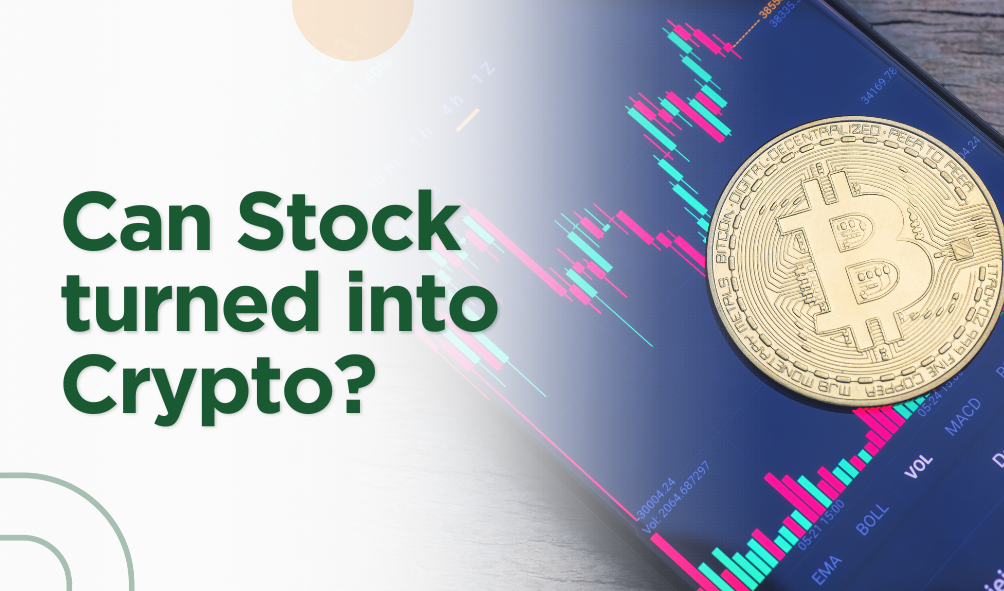Technological developments and financial innovations have fuelled discussions about the possibility of stocks transforming into a form of crypto. This article will discuss whether it is possible for stocks to become crypto, why this is possible, and the impact it could have on global financial markets.
With the rise of blockchain technology and cryptocurrencies, many are wondering if traditional stocks could be transformed into crypto-like digital assets. It’s an interesting concept, given the potential benefits that can be gained from the transparency, efficiency, and security offered by blockchain technology.
What are Stocks and Cryptocurrencies?
Stocks are financial instruments that represent ownership in a company and entitle the holder to a portion of the company’s profits. Shares are traded on stock exchanges and their prices can fluctuate based on company performance and market conditions. Shareholders also have voting rights in company decisions, depending on the number of shares they own.
Meanwhile, cryptocurrencies are digital assets that use cryptography to secure transactions and control the creation of new units. The first most well-known cryptocurrency was Bitcoin, which was launched in 2009 by an individual or group using the pseudonym Satoshi Nakamoto. Cryptocurrencies allow peer-to-peer transactions without the need for intermediaries such as banks, and all transactions are recorded in a distributed ledger known as the blockchain.
Transformation of Stocks into Crypto
Stocks are financial instruments that represent ownership in a company and entitle the holder to a portion of the company’s profits. Stocks are traded on stock exchanges and their prices can fluctuate based on company performance and market conditions. Stockholders also have voting rights in company decisions, depending on the number of shares they own.
Also Read: Inheriting Stocks to Heirs: A Comprehensive Guide
Meanwhile, cryptocurrencies are digital assets that use cryptography to secure transactions and control the creation of new units. The first most well-known cryptocurrency was Bitcoin, which was launched in 2009 by an individual or group using the pseudonym Satoshi Nakamoto. Cryptocurrencies allow peer-to-peer transactions without the need for intermediaries such as banks, and all transactions are recorded in a distributed ledger known as the blockchain.
Transformation of Shares into Crypto
To convert stocks into crypto, blockchain technology can be used to create ‘stock tokens’. These tokens would represent ownership in the same company as traditional shares, but with added benefits such as increased liquidity and the ability to make transactions globally and instantly. Stock tokenisation allows stock owners to have a digital representation of their shares, which can be traded on blockchain platforms.
The process of tokenisation involves converting physical or financial assets into digital tokens that can be traded on the blockchain. In the context of stocks, this means that each share is converted into a digital token that represents a certain amount of ownership in the company. These tokens can then be bought, sold, or traded just like traditional stocks, but with the added benefit of blockchain technology.
Benefits and Challenges
The main benefits of stock tokenisation include greater transparency, increased liquidity, and easier accessibility. Blockchain technology allows all transactions to be permanently and transparently recorded in a distributed ledger, which reduces the risk of fraud and manipulation. Increased liquidity occurs because stock tokens can be traded on various platforms globally, making it easier for investors to buy and sell shares at any time.
Additionally, tokenisation allows small investors to participate in the stock market, as tokens can be divided into smaller units compared to traditional shares. This increases inclusivity and allows more people to invest.
However, challenges include regulatory issues, cybersecurity, and the need for reliable infrastructure to support this ecosystem. Regulation is one of the biggest obstacles, as many countries do not yet have a clear legal framework to deal with digital assets and tokenisation. This creates uncertainty for investors and companies.
Cybersecurity is also a major concern, as blockchain platforms are vulnerable to attacks and hacking. In addition, the infrastructure supporting stock token trading must be reliable and secure to ensure investor confidence.
While the concept of crypto-stocks is exciting and has the potential to revolutionise financial markets, there are many challenges to overcome before this can become widespread. Collaboration between regulators, technology companies and financial markets will be crucial to realising this potential. In addition, education and increased awareness about blockchain technology and tokenisation will help accelerate adoption among investors and companies.
Also Read: What Is The Ruling on Stocks in Islam, Which Includes Halal and Haram Assets?

References
Nakamoto, S. (2008). Bitcoin: A Peer-to-Peer Electronic Cash System. Retrieved from https://bitcoin.org/bitcoin.pdf
Yermack, D. (2017). Corporate Governance and Blockchains. *Review of Finance*, 21(1), 7-31.
Tapscott, D., & Tapscott, A. (2016). *Blockchain Revolution: How the Technology Behind Bitcoin Is Changing Money, Business, and the World*. Penguin.







